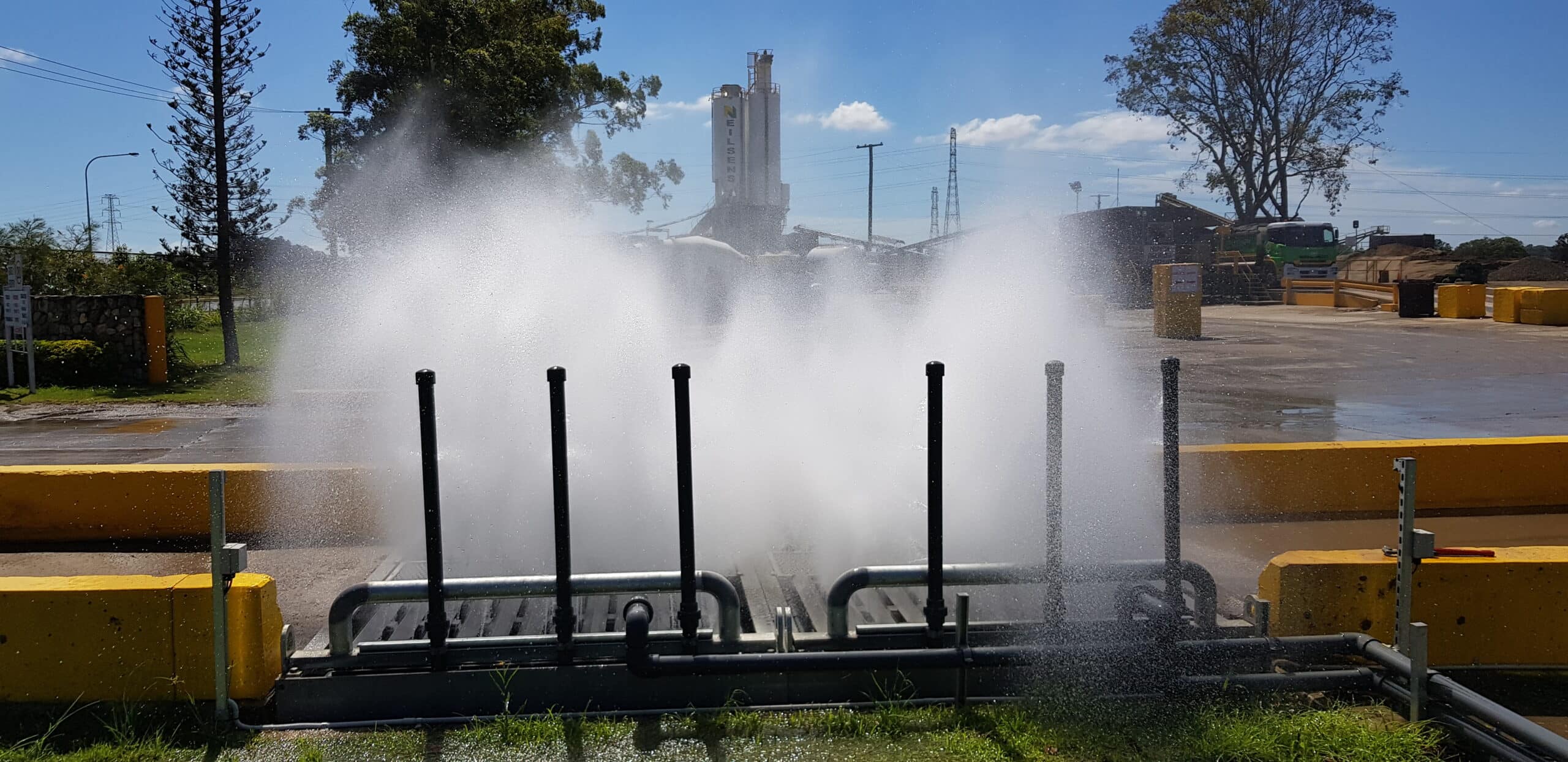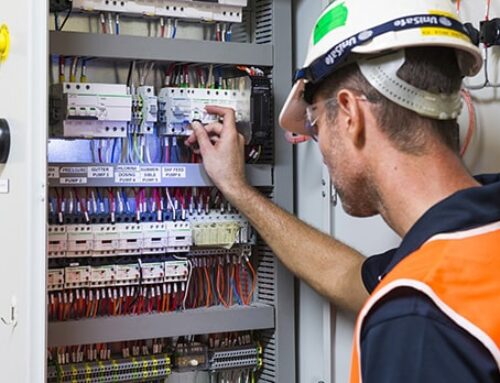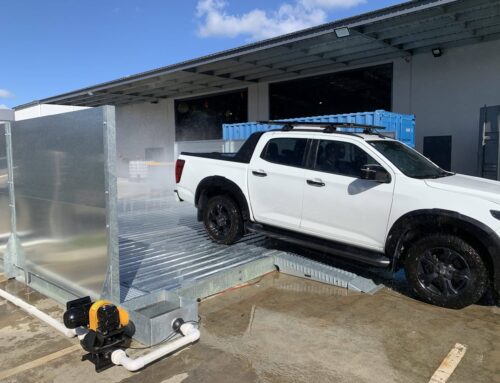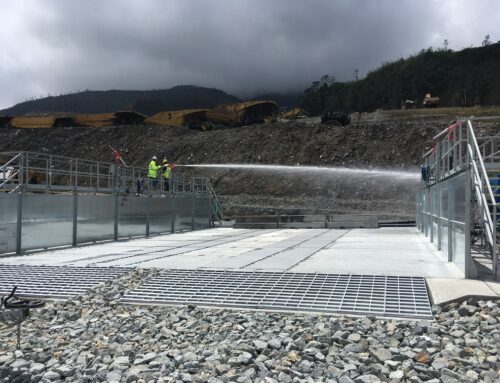Dirty wash water or wastewater is an environmental and operational concern for many industries across Australia. From mining and construction to transport and automotive, dirty wash water or wastewater can compromise compliance, harm equipment, and endanger ecosystems if not properly managed. Is the case of generic wash bay solutions slowing you down? You need custom wash bays, not one-size-fits-all.
This article explores where your dirty wash water or wastewater goes, why you should care, and how to implement effective water recycling systems, wash bay designs, and wash bay equipment to manage it responsibly.
Understanding Dirty Wash Water: What It Is and Common Sources
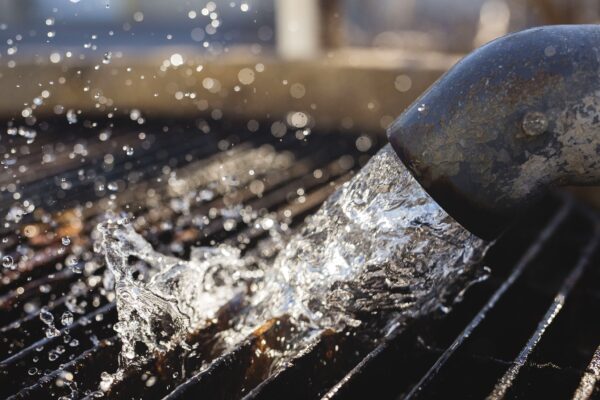
Wash water refers to wastewater produced during the washing of vehicles, machinery, and equipment. It commonly includes:
- Oil and grease
- Detergents, degreasers, and other chemicals
- Heavy metals
- Silt, sludge, and other solids
- Biological contaminants
The most common sources of dirty wash water include:
- Vehicle washing stations at transport yards and depots
- Underbody wash systems in mining and construction
- Workshops and maintenance facilities
- Portable wash bays at temporary or remote work sites
- Washdown of heavy machinery, wheels, and parts on bunded wash bay floors
Dirty wash water often contains a wide range of pollutants and cannot be released untreated into the environment or stormwater system.
The Journey of Dirty Wash Water: Where It Really Goes
In many businesses, dirty wash water travels through wash bay floors into containment pits, holding tanks, or direct drainage systems. If proper treatment processes like oil separators, silt traps, or flush diversion systems are not in place, contaminated water may be:
- Discharged into council trade waste systems without meeting pre-treatment standards
- Illegally released into stormwater drains, rivers, or groundwater
- Stored in non-compliant holding tanks that eventually overflow or require costly removal services
Water authorities and local councils require compliance with environmental discharge limits. Businesses that bypass proper treatment or use ineffective systems face risks, including the case of regulatory penalties, shutdowns, and environmental damage.
The reality is that a poor-quality water treatment system compromises more than just compliance—it disrupts operations and affects your reputation. Don’t let the case of non-compliance put your operations at risk.
Protect your business and the environment—contact EnviroConcepts today to discuss compliant, cost-effective water treatment solutions and portable wash bays tailored to your needs.
Why You Should Care: The Environmental Impact of Untreated Wash Water
Untreated wash water discharged into the environment introduces a host of issues:
- Surface water contamination from suspended solids, oils, and chemicals
- Groundwater pollution due to lack of bunding or permeable surfaces
- Eutrophication of rivers and lakes, harming aquatic ecosystems
- Odour generation from organic pollutants
- Harm to local residents and public health from contaminated runoff
The case of environmental compliance is essential for avoiding fines, maintaining permits, and preserving natural ecosystems. Water recycling systems and proper containment infrastructure protect both your operation and the surrounding communities. Avoid fines—upgrade to compliant portable wash bay solutions now.
Health Risks Associated with Dirty Wash Water
Improperly treated wash water isn’t just an environmental threat; it poses real occupational hazards. In workshops and washing areas without adequate wash bay systems, wash water can contribute to:
- Skin irritation, infections, and respiratory problems from chemical exposure
- Slip hazards due to oil or grease on wash bay floors
- Exposure to pathogens such as E. coli from vehicle wash or underbody wash areas
- Long-term health issues from volatile chemicals like benzene and xylene
Routine cleaning and treatment processes are essential. Workplaces should be equipped with bunded bays, oil water separators, and designated washdown zones to isolate contaminants. Water quality standards enforced by the water authority help minimise risks for all industries.
Simple Solutions: How to Properly Dispose of and Manage Wash Water
Managing dirty wash water doesn’t require a massive overhaul—just the right wash bay system and process. Here’s a streamlined guide to effective wash water management:
- Containment
Design your wash bays with engineered bunding, adequate drainage, and solid construction. This includes portable wash bay options for mobile operations and bunded underbody wash solutions for heavy vehicle cleaning services. - Pre-treatment
Install oil water separators, silt traps, and flush diversion systems in your wash bay to isolate and remove pollutants. Select treatment methods that suit your application—whether for light vehicle wash operations or heavy-duty mining equipment washdown services. - Regulation
Ensure discharge water meets the water authority and local authority compliance. Secure a trade waste discharge permit and maintain detailed records for auditing. - Ongoing Maintenance
Schedule regular inspections of screens, filters, pumps, and treatment media. Maintain your wash bay systems to prevent blockages and ensure performance. Don’t let frequent breakdowns of subpar wash bay equipment slow you down.
Recycling and Reusing Wash Water: A Sustainable Approach
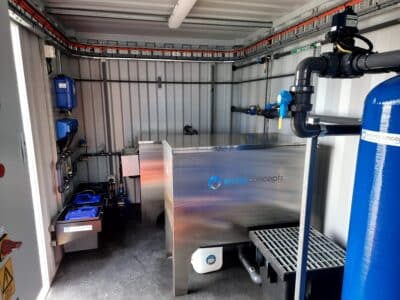
Water recycling systems transform wash water from a liability into a resource. By implementing the right treatment technology, businesses can reduce water consumption, lower costs, and meet environmental responsibilities.
Common recycling systems include:
- Oil water separators for free-floating hydrocarbons
- Continuous media filtration for solids removal
- Clarifiers for suspended particles and sediment
- Reverse osmosis systems for polishing treated water
- Chemical dosing and disinfection for compliance with reuse standards
Wash water recycling systems provide consistent water quality for reuse in high-pressure washers, wheel cleaning systems, and chemical cleaning applications. These systems are ideal for industries facing drought, high water bills, or strict wastewater limits.
System Comparison Table
| Treatment System | Best For | Benefits |
| Oil Water Separator | Automotive & Transport Bays | Efficient oil removal |
| Continuous Media System | Mining & Heavy Industry | Handles high solids loading |
| Reverse Osmosis | Workshops & Sensitive Applications | High purity water reuse |
| Clarifiers | Construction & Wash Bays | Gravity-based solid separation |
Australian-made wash water systems from trusted providers can be designed, installed, and serviced without the delays of international shipping. Yes, you can have a custom solution without long lead times. Contact EnviroConcepts today!
Protecting Our Waterways: Your Role in Clean Water Initiatives
Every business contributes to the collective impact on Australia’s waterways. When industrial operations invest in compliant, tailored wash bay designs and water treatment solutions, they:
- Help control pollution and reduce stormwater discharge
- Support local environmental standards and water quality objectives
- Promote sustainable practices in the automotive, mining, and transport sectors
Industries operating near sensitive environmental areas or water-scarce regions have an even greater obligation to install compliant wash bay equipment, bunded wash bays, and treatment systems that prevent runoff and protect ground surfaces.
Whether your operation includes a small fleet or heavy-duty equipment, there are engineered wash bay products designed to meet your specific needs. Portable and modular systems can be used across multiple areas of operation, with flexibility for future expansion.
Our 3-Step Process to Clean, Compliant Wash Bays
Step 1: Site Assessment and Design
After you contact us, we evaluate your site, type of equipment, and discharge needs to build a tailored portable wash bay and water recycling solution.
Step 2: Australian Manufacturing and Installation
Our products are manufactured locally, ensuring quality control and quick delivery. Our team installs the portable system, including oil water separators, bunding, pits, and pressure pumps.
Step 3: Service and Support
Post-installation, we offer training services, maintenance, replacement parts, and upgrades. Whether it’s odour control, rainwater harvesting integration, or media replacement, we provide complete after-sales services.
Turning Compliance into Capability: Your Next Step in Smart Wash Water Management

Operations managers in industries like mining, construction, automotive, and transport face increasing pressure to comply with environmental regulations while improving operational efficiency. Struggling with suppliers who don’t get your needs? Discover custom portable wash bays made right here in Australia.
Enviroconcepts provides reliable, customisable, and fully compliant water treatment and portable wash bay systems. Our solutions are engineered to suit a wide range of industries and applications, from small commercial sites to large industrial workshops.
We build systems that:
- Treat wash water for discharge or reuse
- Meet all local authority and water authority regulations
- Help businesses avoid environmental incidents and fines
- Fit easily into existing operational workflows
- Include modular, bunded, and portable components
Looking for local support you can trust? Yes, we’ve got you covered. Contact our team. Enviroconcepts offers Australian-made solutions, tailored engineering, and dependable service nationwide.
For more information or to get a quote, contact our team or view our product range today.

